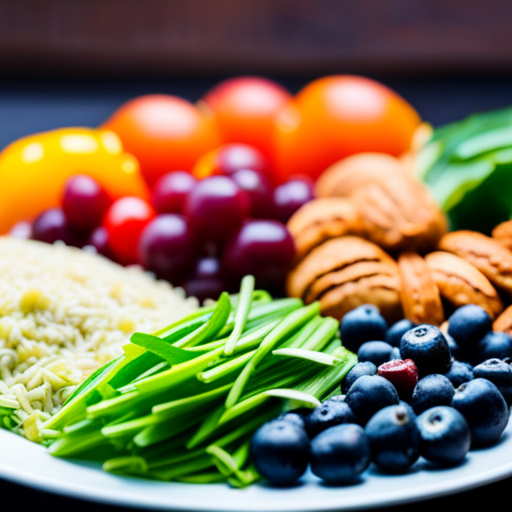The Role of Fiber in Weight Loss: What You Need to Know
Did you know that fiber plays a crucial role in weight loss? Yes, it’s true!
If you’re looking to shed those extra pounds, understanding the importance of fiber in your diet is essential. Fiber not only keeps you feeling fuller for longer, but it also helps regulate your digestion and keeps your blood sugar levels in check.
By incorporating fiber-rich foods into your meals, you can support your weight loss journey in a safe and effective way. But, where can you find the right sources of fiber? And how much fiber should you be consuming daily?
In this guide, we will explore the role of fiber in weight loss and provide you with all the information you need to know to reach your goals safely.
Key Takeaways
- Fiber keeps you feeling fuller for longer, which can help control appetite and aid in weight loss.
- Fiber promotes the growth of beneficial gut bacteria and regulates digestion, preventing constipation and promoting healthy bowel movements.
- Fiber slows down the absorption of glucose and improves insulin sensitivity, making it beneficial for individuals with diabetes and supporting healthy blood sugar levels.
- It is important to consult with a healthcare professional before making significant changes to your diet, especially when incorporating fiber-rich foods and supplements, to ensure safety and well-being.
Benefits of Fiber for Weight Loss
To achieve weight loss, incorporating fiber-rich foods into your diet offers numerous benefits. Fiber is an essential component of a healthy diet and plays a crucial role in maintaining overall gut health. When it comes to weight loss, fiber can be a game-changer.
Not only does it help you feel fuller for longer, but it also aids in digestion and keeps your gut functioning optimally.
One way to increase your fiber intake is by consuming fiber-rich foods such as fruits, vegetables, whole grains, legumes, and nuts. These foods aren’t only packed with fiber but also provide essential nutrients and vitamins.
Another option is to include fiber supplements in your diet. These supplements are an easy and convenient way to boost your fiber intake, especially if you find it challenging to consume enough fiber through food alone.
Research has shown that fiber has a positive impact on weight loss. It increases feelings of satiety, reducing hunger and preventing overeating. Additionally, fiber slows down the digestion process, which helps regulate blood sugar levels and prevents spikes in insulin. This is particularly beneficial for individuals with diabetes or those at risk of developing it.
Furthermore, fiber plays a crucial role in maintaining gut health. It acts as food for beneficial gut bacteria, promoting a healthy and diverse microbiome. A healthy gut microbiome has been linked to weight management and overall well-being.
Incorporating fiber-rich foods and supplements into your diet can have a significant impact on your weight loss journey. Not only will it help you feel fuller and satisfied, but it also supports healthy digestion and promotes a thriving gut microbiome. Remember to consult with a healthcare professional before making any significant dietary changes or starting any new supplements to ensure your safety and well-being.
How Fiber Keeps You Feeling Fuller
Incorporating fiber into your diet helps you feel fuller for longer, supporting your weight loss goals. Here’s why fiber is important for keeping you satisfied:
-
Increased satiety: Foods high in fiber take longer to digest, which helps you feel fuller for a longer period of time. This can prevent overeating and snacking between meals, ultimately aiding in weight loss.
-
Gut health: Fiber acts as a prebiotic, promoting the growth of beneficial gut bacteria. A healthy gut microbiome is essential for proper digestion and nutrient absorption, which can contribute to overall feelings of fullness and satisfaction.
-
Blood sugar regulation: High-fiber foods, such as fruits, vegetables, and whole grains, have a lower glycemic index, meaning they don’t cause a rapid spike in blood sugar levels. This helps to stabilize your energy levels and prevent cravings for sugary, high-calorie foods.
-
Heart health: Consuming an adequate amount of fiber has been linked to a reduced risk of heart disease. Fiber helps to lower cholesterol levels by binding to cholesterol molecules in the gut and preventing their absorption into the bloodstream.
The Role of Fiber in Regulating Digestion
Boosting your fiber intake helps regulate digestion. Fiber plays a crucial role in maintaining gut health and preventing constipation. It adds bulk to your stool, making it easier to pass through your digestive system. Additionally, fiber acts as a prebiotic, providing nourishment for the beneficial bacteria in your gut, which helps maintain a healthy balance of microorganisms.
| Fiber and Gut Health | Fiber and Constipation |
|---|---|
| Fiber promotes the growth of beneficial bacteria in the gut. These bacteria help break down food and produce short-chain fatty acids that nourish the cells lining your intestines. A healthy gut microbiome is associated with improved digestion and overall well-being. | One of the main benefits of fiber is its ability to prevent and relieve constipation. It adds bulk to your stool, making it easier to pass through the intestines. It also helps regulate bowel movements by increasing the frequency and improving the consistency of stools. |
Increasing your fiber intake can help prevent and alleviate constipation. It is recommended to consume a variety of fiber-rich foods, such as fruits, vegetables, whole grains, and legumes. Aim for at least 25 grams of fiber per day for women and 38 grams for men. Remember to increase your fiber intake gradually and drink plenty of water to prevent bloating and discomfort. If you have any underlying medical conditions or are taking medications, it is always best to consult with a healthcare professional before making significant changes to your diet.
Fiber and Its Impact on Blood Sugar Levels
Increase your fiber intake to regulate blood sugar levels and support weight loss. Fiber plays a crucial role in managing blood sugar levels, especially for individuals with diabetes or those looking to improve insulin sensitivity. Here are some important points to consider:
-
Fiber slows down the absorption of glucose: Soluble fiber forms a gel-like substance in the digestive tract, which slows down the absorption of sugars into the bloodstream. This helps prevent spikes in blood sugar levels after meals.
-
Fiber improves insulin sensitivity: Studies have shown that a high-fiber diet can improve insulin sensitivity, making it easier for your body to use insulin effectively. This is particularly beneficial for individuals with diabetes, as it can help regulate blood sugar levels more efficiently.
-
Choose whole foods over processed options: Whole foods like fruits, vegetables, whole grains, legumes, and nuts are excellent sources of fiber. They also provide additional nutrients and antioxidants, making them a healthier choice compared to processed foods.
-
Increase fiber intake gradually: To avoid digestive discomfort, it’s important to increase your fiber intake gradually and drink plenty of water. This allows your body to adjust and prevents issues like bloating or gas.
Choosing the Right Sources of Fiber
To ensure you’re getting the most out of fiber for weight loss, it’s important to choose the right sources of fiber. Incorporating fiber-rich foods into your diet can help you feel fuller for longer, regulate your digestion, and support healthy weight management. Here are some excellent sources of fiber to consider:
| Fiber Supplements | Fiber-Rich Snacks | Benefits |
|---|---|---|
| Psyllium husk | Almonds | Helps control appetite |
| Chia seeds | Apples | Aids in digestion |
| Flaxseed | Carrots | Promotes healthy gut bacteria |
| Inulin | Berries | Regulates blood sugar levels |
| Acacia fiber | Popcorn | Supports weight loss |
Fiber supplements can be a convenient option if you struggle to meet your daily fiber needs through diet alone. However, it’s important to consult with your healthcare provider before starting any new supplements. When selecting fiber-rich snacks, opt for whole, unprocessed foods that are low in added sugars and unhealthy fats. Incorporating a variety of fruits, vegetables, nuts, and seeds into your daily snacking routine can provide a diverse range of fiber types and other essential nutrients.
Remember to increase your fiber intake gradually and drink plenty of water throughout the day to prevent digestive discomfort. By choosing the right sources of fiber, you can enhance your weight loss efforts and improve your overall health and well-being.
Recommended Daily Fiber Intake for Weight Loss
The recommended daily fiber intake for weight loss can depend on factors such as your age, sex, and level of physical activity. However, on average, adult women should aim for a daily intake of 25 grams of fiber, while adult men should aim for 38 grams. Increasing your fiber intake can help you feel fuller for longer, which can aid in weight loss by reducing overall calorie consumption.
Here are four practical tips to help you incorporate more fiber into your diet:
-
Choose whole grains: Opt for whole grain bread, pasta, and cereals instead of their refined counterparts. Whole grains are rich in fiber and can help you feel satisfied.
-
Load up on fruits and vegetables: These natural sources of fiber aren’t only nutritious but also low in calories. Aim to include a variety of fruits and vegetables in your meals and snacks.
-
Include legumes in your diet: Beans, lentils, and chickpeas are high in fiber and protein, making them a great addition to your weight loss plan.
-
Consider fiber supplements: If you struggle to meet your recommended daily fiber intake through food alone, fiber supplements can help bridge the gap. However, it’s essential to consult with a healthcare professional before starting any supplements.
Incorporating Fiber-Rich Foods Into Your Diet
To incorporate more fiber-rich foods into your diet for weight loss, focus on adding a variety of nutritious options to your meals and snacks. Including fiber-rich foods in your diet can help you feel fuller for longer and aid in weight management.
Start by incorporating whole grains such as oats, quinoa, and brown rice into your meals. These grains are high in fiber and can be used as a base for dishes like salads, stir-fries, and grain bowls.
Additionally, fruits and vegetables are excellent sources of fiber. Berries, apples, broccoli, and spinach are all great choices. You can add them to smoothies, salads, or enjoy them as a snack.
Legumes like beans, lentils, and chickpeas are also high in fiber and can be incorporated into soups, stews, and salads.
Finally, nuts and seeds like almonds, chia seeds, and flaxseeds aren’t only high in fiber but also provide healthy fats. They can be sprinkled on top of yogurt, oatmeal, or added to baked goods.
If you’re looking for specific recipes that are high in fiber, there are plenty of fiber-rich recipes available online to help you get started. Remember, it’s always best to get your fiber from whole foods rather than relying solely on fiber supplements, as whole foods provide additional nutrients and benefits.
Frequently Asked Questions
Can Fiber Supplements Be Used as a Substitute for Fiber-Rich Foods?
Fiber supplements may seem like an easy option, but they can’t fully replace fiber-rich foods. Natural sources provide essential nutrients and promote better digestion and gut health, which supplements may not fully replicate.
Are There Any Negative Side Effects of Consuming Too Much Fiber?
Eating too much fiber can have negative effects on your digestive system. It can cause bloating, gas, and diarrhea. It’s important to stick to the recommended daily fiber intake for optimal health.
Does the Type of Fiber (Soluble or Insoluble) Make a Difference in Weight Loss?
The type of fiber you consume can affect your weight loss journey. Soluble fiber promotes gut health and helps you feel fuller for longer, while insoluble fiber aids in digestion. Both types are beneficial for weight management.
Can Fiber Help With Reducing Cravings for Unhealthy Foods?
Fiber can help reduce cravings for unhealthy foods. It increases satiety and helps control blood sugar levels. Including fiber-rich foods in your diet can be a practical and evidence-based approach to managing weight and promoting overall health.
Is It Necessary to Track Fiber Intake When Following a Weight Loss Plan?
Is it necessary to track your fiber intake when trying to lose weight? Yes, it is. Tracking fiber intake can help you manage your weight by promoting feelings of fullness and aiding in digestion.
Conclusion
Incorporating fiber into your weight loss journey can have a significant impact on your success.
Not only does fiber keep you feeling fuller for longer, but it also regulates digestion and helps stabilize blood sugar levels.
By choosing the right sources of fiber and meeting the recommended daily intake, you can enhance your weight loss efforts.
Imagine fiber as the anchor that keeps you steady on your path to a healthier, fitter you.
So start adding fiber-rich foods to your diet today and watch the pounds melt away.







